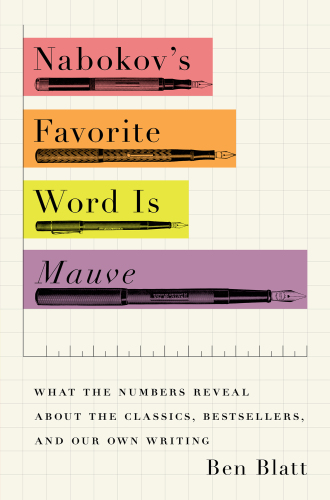
Nabokov's Favorite Word Is Mauve
And Other Experiments in Literature
کتاب های مرتبط
- اطلاعات
- نقد و بررسی
- دیدگاه کاربران
نقد و بررسی

January 16, 2017
In this diverting if lightweight work, statistician Blatt (coauthor of I Don’t Care If We Never Get Back) applies data analysis techniques to the work of hundreds of authors, from Jane Austen to E.L. James, to extract insights into literary art and human psychology. Opening with the dramatic story of 1960s researchers who used word frequency techniques to solve the Federalist Papers’ authorship, the book never follows up on the promise of comparably exciting or substantial findings. Blatt applies his techniques to look at topics such as adverb usage, the relationship between word choice and gender, and trends in writing complexity. After quick, clear, but cursory descriptions of methods, Blatt details creative visualizations (charts and graphs are included) and findings, but limits the conclusions that can be drawn (“Trying to draw too much meaning out of these findings is a bit like reading tea leaves”). This leaves the reader with the feeling of having witnessed engaging parlor tricks instead of scholarly inquiry. But parlor tricks are fun, and so is this book. Blatt provides amiable and intelligent narration, and literature enthusiasts will enjoy the hypotheses he poses and his imaginative methods. Agent: Jacqueline Ko, Wylie Agency.

January 15, 2017
Literary criticism by the numbers.Writers write--and write and write. In fact, notes former Slate staffer Blatt (co-author: I Don't Care if We Never Get Back: 30 Games in 30 Days on the Best Worst Baseball Road Trip Ever, 2014), they write more once they get going than when they started. A useful example is J.K. Rowling, whose first Harry Potter book came in at 78,000 words--but who wrote a follow-up three times as long. "If the unknown Rowling had written an 870-page version of the first book in 1997," writes the author, "it would likely have had a much harder time getting published (and getting readers to pick it up)." We are able to know things such as book inflation by applying techniques of big data to the corpus of literature. In Blatt's opening examples, the discussion centers on adverbs, which writers such as Stephen King and Ernest Hemingway have scorned. By doing part-of-speech searches of whole books or even just looking for words that end in -ly (only one class of adverb, as Blatt notes), we can see that those two authors didn't always practice what they preached--and again, that Hemingway's early, harder-worked books were leaner than his later ones, True at First Light being almost twice as adverbial as The Sun Also Rises. One takeaway for writers: "The best books--the greats of the greats--do use a lower rate of -ly adverbs." Statistical approaches to literature have sometimes produced barren results, but Blatt has obvious fun poking around in the stacks, conducting literary experiments that sometimes turn into object lessons: if you want to write like a Brit, use "brilliant," but not too much, lest you sound like an American trying to sound like a Brit. If you want to avoid ridicule, avoid cliches like "past history." And always avoid opening with the weather--unless you're Danielle Steel. If you want to know how many times Chuck Palahniuk uses the verb "snuff," this is just the thing. Illuminating entertainment for literary readers.
COPYRIGHT(2017) Kirkus Reviews, ALL RIGHTS RESERVED.

























دیدگاه کاربران